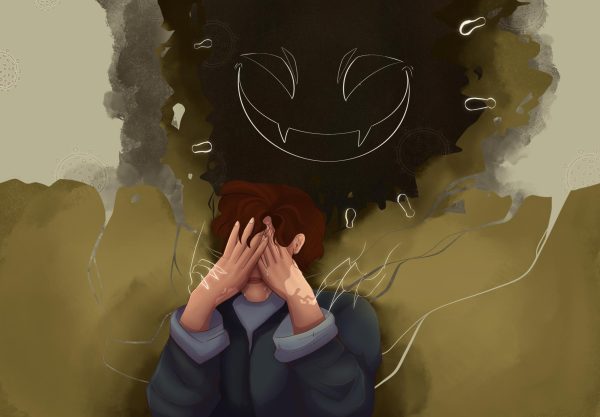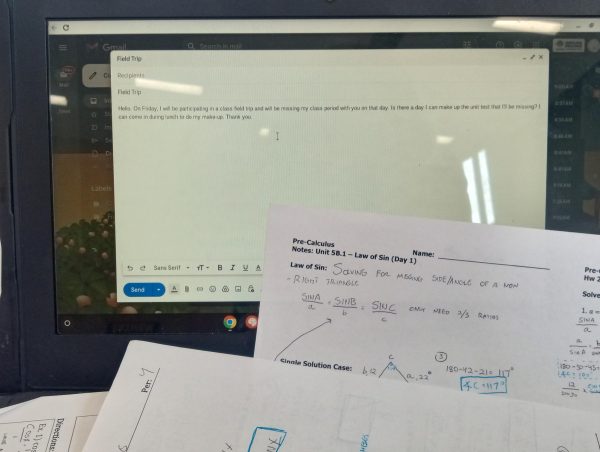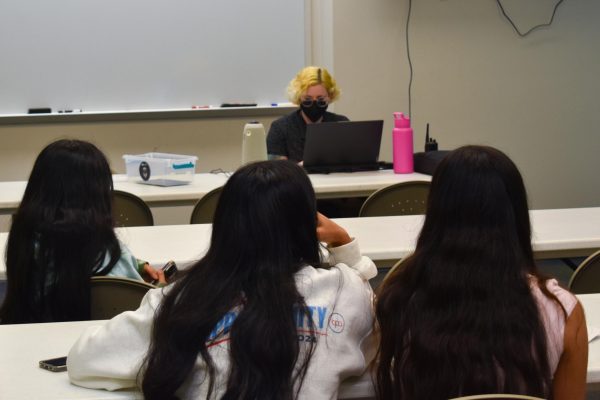Metea addresses the positive, and negative aspects of Mental Health

Students of Metea discover resources available to them about mental health.
September 21, 2021
This article mentions suicide and mental illness.
This year students noticed a big change with their IDs. Displayed on the back of all Metea ID cards is the National Suicide Prevention Lifeline, as well as the phone number 74141, which students can text REACH to, and connect with a crisis counselor.
This new change is due to Gov. J.B. Pritzker who signed a bill this past summer. The bill mandates all school IDs in the state of Illinois, grade level six and above, including colleges and universities, are required to have access to the National Suicide Prevention Lifeline, a crisis text line, Safe2Help Illinois, and any other local suicide prevention hotline not mentioned.
“Prioritize your mental health, and take time for yourself,” health teacher Ashley Hartke said. “Recognize that you cannot do everything.”
Hartke is one of the health teachers at Metea. In health class, a part of what she teaches is mental health as well as the importance of it.
“Normalizing that we all have to manage our mental health makes it more approachable,” Wange said.
At Metea, Jaine Wange is the mental health coordinator, and is a sponsor for the Mental Health Matters club at Metea. Five years ago, the club formed after two students at Metea lost their lives due to suicide. The club wanted a voice about mental health to prevent future suicide attempts from happening again. According to Wange, mental health is a part of everyday life. Everyone has to take care of their mental health. Wange wants everyone to realize that they have to manage their mental health.
¨We all have something to take care of mentally, and it is a silent killer,¨ sophomore and Mental Health Matters member Mona Kusumoto said.
In the past, the club held therapy dog visits during lunch periods, and stressbuster activities during finals week. Kustomoto said that these activities were a solution to a problem which was how to reduce stress for students.
¨The topics that we cover are relevant to students at the moment, and can have a lifelong impact,¨ Hartke said.
Health is a required class for all students to take in order to graduate. As Hartke mentioned, the topics covered in the class personally relate to the students.
¨PE classes are doing weekly SEL lessons, so as a district and as a building, we are valuing and understanding the importance of mental health,¨ Hartke said.
SEL stands for social emotional learning, and in these lessons students learn valuable information that relates to life right now. Last week´s SEL lesson was about how technology has made people into digital zombies. The lesson taught students how to limit technology usage during the day, which promotes our mental and social health.
¨I have had students sign up for multiple AP classes, and you can be a downright genius and still it takes up a lot of time to keep up with those courses,¨ Wange said. ¨Think have I chosen courses that are of my interest, and that are going to lead me to my goal, but not stress me out.¨
According to Wange, the goal when it comes to maintaining mental health is by managing what causes stress, or feelings of overwhelm. If life starts to come out of balance and no matter how hard students try to cope, it will become overwhelming.
¨We are always going to have stressors in our life, and challenges,¨ Hartke said.
Since all students will experience moments of grieving, anger, and anxiety, Hartke focuses on providing students with ways to cope or handle. To get through these emotions, finding ways to cope or handle the situation will positively improve students’ mental health.
¨If you were to fall and have a broken arm, you would immediately be asking for help, and people would be running to you,” said Hartke. “We have to do the same thing when it comes to mental health.¨
Hartke believes health is different from other issues because it is not always visible to others. The only way to communicate about mental health is by talking about it.
¨I think a stigma is that sometimes mental illnesses are a sign of weakness,¨ Hartke said. ¨We have to recognize when someone is truly suffering from a mental illness,¨
There is a stigma surrounding mental illness that Hartke mentioned, and how it is seen as a weakness. To break that stigma, realize that not everyone is capable of handling life´s problems on their own, and need that help.
¨If someone looks for help, it will affect them negatively somehow down the road,” Wange said.
Wange stated that the fear with getting mental health support is that it shows up in records, or that it will cause repercussions down the road. The stigma surrounding mental health support is that it is seen as a weakness, or negative aspect of a person. While getting the help needed is meant to improve mental health.
Mental health in the Metea community matters. Both Wange and Hartke encourage students to talk to a parent, trusted adult, or friend if experiencing negative feelings like anxiousness, depression, or stress. Another option is Metea’s guidance counselors, psychologist, or a social worker are also available to talk to in the class houses. On the Metea counselling website to find the warmline form. All information sent through the form will only be seen by guidance staff and kept confidential.
Suicide prevention month is a campaign to raise awareness and openly talk about mental health, and why it is important. According to an article from CNN Health, the rate of suicide has grown over the past twenty years, and with the pandemic that rate may increase more. At Metea Valley, staff members are able to help with multiple resources around the building available for students.
¨Students are overly worried about school and stuff, and do not sometimes think about it,” Wange said. ”You have got to have fun in your life. Something to look forward to, even if it is the simple things.¨


















